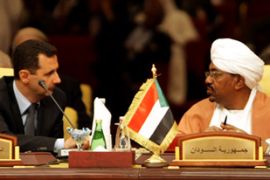Arab leaders gather for Doha summit
Differences over issues like Iran run deep as leaders begin to arrive ahead of talks.

Instead, the foreign ministers of those countries, in a meeting on Sunday, adopted a draft final statement that glossed over contentious issues, focusing on “general resolutions that reflect the Arab consensus”.
ICC ‘criticism’
Sheikh Hamad bin Jassim bin Jabr Al Thani, Qatar’s prime minister and foreign minister, expressed hope that any differences in Arab states’ viewpoints might eventually lead to positive results.
| In depth |
|
|
Delegates are likely to be united in their condemnation of the arrest warrant issued by the International Criminal Court (ICC) in The Hague against al-Bashir.
Sudan has already rejected the court’s decision to allow the prosecution of al-Bashir on charges of war crimes and crimes against humanity in the country’s western Darfur region.
Marwan Bishara, Al-Jazeera’s senior political analyst, said: “The West generally tends to underestimate how much their interference in the Arab world tends to backfire to the advantage of leaders who would then use it for a populist nationalist sentiment in order to gather support for themselves.
“As a result popular upheaval against al-Bashir is certainly not working,” he said.
It was unclear if al-Bashir will attend the Qatar conference.
While the leaders appear to be united in their opposition of the arrest warrant against al-Bashir, the Arab world’s relations with Iran remain the major sticking point among them.
“The Doha summit is still a battleground between the emerging de facto alliance between Qatar, Syria and Iran, on one side, and the Saudis, Egyptians and Jordanians, on the other,” Ali al-Ahmed, a Saudi opposition figure, said.
|
“The Doha summit is still a battleground between the emerging de facto alliance between Qatar, Syria and Iran, on one side, and the Saudis, Egyptians and Jordanians, on the other” Ali al-Ahmed, |
Arab governments have struggled to respond to Iran’s growing political clout, which has greatly increased since the US invasion of Iraq in 2003.
The leaders of Egypt and Saudi Arabia say that Iran is key to the strength of Hezbollah in Lebanon and Hamas in the Palestinian territories – groups which refuse to renounce armed action in the historic Arab conflict with Israel.
Other Arab countries with good ties to Iran, such as Syria and Qatar, back the populist view in the Arab world that the policies of Hezbollah and Hamas are legitimate responses to Israel, which rejects returning Arab lands it seized in the 1967 Arab-Israeli war.
Israel’s recent 22-day war on Gaza has exposed divisions between Arab states.
Qatar recently hosted a crisis summit that brought together Arab leaders, as well as Mahmoud Ahmadinejad, the Iranian president, and leading figures from Hamas.
The meeting threatened to revoke an Arab peace proposal to Israel, championed by Washington’s Arab allies.
Arab reconciliation
In a bid to ensure attendance by other Arab leaders at Monday’s Arab League summit, Qatar has said that neither Iran nor Hamas have been invited to attend.
Mahmoud Abbas, the Palestinian president and leader of the Fatah group, had threatened to join Mubarak in boycotting the summit if Hamas was invited.
Jamal Khashoggi, editor of Saudi daily al-Watan, said Mubarak’s absence from the summit would not affect Saudi and Egyptian-led attempts to get Hamas to join a Palestinian unity government with Fatah.
“The others will carry out the plan developed by the mainstream countries. The only position in Doha is the Egyptian-Saudi policy. It’s the only one on the table.”
Al Jazeera’s Ahmed Janabi, reporting from the summit venue, said that some quarters were still hopeful that the talks would help to forge unity among Arab states.
Riyad al-Maliki, the Palestinian foreign minister, said the Palestinians were hopeful that the summit would facilitate that reconciliation.
“Arab foreign ministers gave the reconciliation issue a long time in their discussion before the summit, therefore I really believe this summit can be called the Arab Reconciliation summit,” he said.

 Regional crises hound Arab League
Regional crises hound Arab League